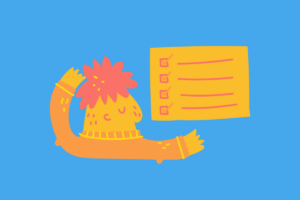Tips that save time.
Not every day is mighty productive … I’m sure you can relate to this. Sometimes you just don’t feel like doing anything valuable even though you know you should.
Being able to come to work with the same amount of productivity in you every day is next to impossible. And by coming to work I also mean working for yourself from your home office.
Thankfully, there are some things we can do to help us remain productive. Actually, there’s a massive amount of those things, which I’m sure you know if you’ve been on the internet for any amount of time. But today I just want to show one simple approach – the one I’m using for over two years now.
First of all, I don’t trust myself. I don’t believe that “me” is the best possible person to entrust my productivity to. That’s why I’m using a system – something that can’t possibly fail because there’s no human factor, just rules and guidelines.
So here’s what I do.
1. Warm up
The first thing I do in the morning (at least the first thing related to work) is warming up a little. I’ve been talking about warming up for quite a while now in a number of guest posts and also a couple of times on this blog, so let me just briefly sum up the whole thing.
A warm up is something that helps you to get going. Just like with physical exercise. You can’t go to the gym and start with heavy weights right from the get-go if you want to get out of the gym alive.
Here it’s not a matter of life and death, but not warming up can still cause some problems later on during your day.
A perfect warm up task is something you can do without any effort. Something that’s easy, can be done fast, and does not require any preparation, yet it is still related to what you’ll be doing throughout your workday.
For instance, something that works very good for me is writing an online journal. Each day I start my work by writing a 200-500 word entry about WHATEVER.
This sets my mind up in a certain direction and lets me switch to my main tasks more smoothly.
Of course, you can start with something else. As an online business owner you can probably do things such as: blog commenting, forum posting, checking your stats, and so on.
However, don’t start with email. Email is tricky and it can trap you in the inbox for long hours.
2. Review and plan
This is a good point to review what you did yesterday and plan your work for today.
Please, don’t make your to-do list too packed with tasks. There’s no point it completing half of your planned tasks, and then feeling bad that you didn’t handle the rest. There’s a simple solution to this – don’t plan to do too much stuff!
If you’ve been doing what you’re doing for more than two months then I’m sure you can estimate how much stuff you can handle in a day pretty accurately, so just stick to this.
Now, each day should have one (only one) critical task. A critical task is something that has to be done in a given day, or the day has to be considered a wasted one.
In plain English, this is a task you absolutely have to do.
3. Start with simple tasks
Your critical task is most likely something that requires a fair amount of work and might not be that easy. Therefore, it’s not the best thing to start your day with. Going with something simple is a lot better idea.
Go through your to-do list and find one or two tasks that won’t be that hard to handle and you’ll probably be done with them in half an hour.
This is just another form of warming up, but this time you’re doing a specific thing, not your general warm up task.
The point here is to get you going at full velocity. Remember, getting started is always the most difficult part. Once you get to your top speed of working, maintaining it is a lot easier.
4. Handling the critical task
Now is time to get your critical task done.
… Not much I can say about it, really. You’re the one doing the work, so you probably know best what you need in order to complete your critical task.
The only general advice I have for you here is to set your resources in place before you start working on your critical task. That way you won’t have to interrupt your work to find a given piece of information.
And let me say this again, having more than one critical task set for a day is too many. If at this point you still feel that you have at least 4-5 critical things to do in your every workday then they probably are not that critical after all… You should probably reevaluate what you’re doing.
5. Complete the rest of your tasks
Since you’re done with your critical task, now you can handle the rest of the items on your to-do list.
The advice I have here is not to overwork and spend the whole night up doing stuff just because it’s on your to-do list.
If you can’t finish your whole to-do list in 6-8 hours then you’re working too much. And I really mean it … 6-8 hours is enough. The point is not to work much, it is to work effectively.
The lesson here: Plan less stuff in the future.
Having frequent breaks
The final advice in this guide is about having frequent breaks, something I haven’t mentioned yet.
My perfect approach for working is to follow such a schedule (and again, this isn’t the first time I’m talking about it):
- work for 50 minutes,
- have a 10 minute break,
- work for another 50 minutes,
- have a 30 minute break,
- repeat.
So there you go … my system of remaining productive for long periods of time. Even when I’m not feeling productive on certain days, I can usually get going anyway by following this system.
I hope this approach will turn out to be effective for you too. In the meantime, feel free to shoot me a comment and let me know what you think about this whole thing.



